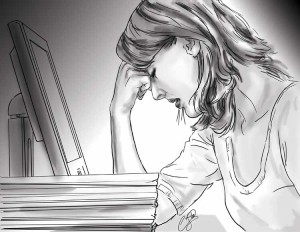Mental health services need refocusing
USC often shows great concern for the well-being of its students, but the university seems to have focused mainly on physical health and neglected to consider students’ mental health, which has been a growing concern at colleges across the United States.
According to “The American Freshman: National Norms” Fall 2010 annual survey, freshmen emotional health has fallen to a 25-year low, with an almost unprecedented number of students reporting that they are “below average” in emotional health and “overwhelmed” by stress. And as students near graduation, stress levels only increase.
Sometimes, tragic events prompt students to seek personal counseling from USC. The mental health of students, however, should not be reserved for these instances.
On a daily basis, students are subjected to a crushing load of stresses, be it from academics and career hunting to extracurricular obligations and personal life concerns.
A four-chapter chemistry midterm tomorrow conveniently coincides with the due date for an eight-page WRIT 140 paper. Your significant other’s surprise birthday dinner occurs the night before a huge blood drive you are in charge of organizing.
And before you even have time to catch your breath, it’s finals week and crunch time again. According to an Associated Press and mtvU study in 2009, 85 percent of college students reported feeling stressed on a daily basis.
As Jackie Ayers, former president of the American College Health Association, noted, “Some of the most common mental health problems we see on our campus these days are depression, stress/anxiety disorders, relationship issues, alcohol and drug use, [and]sleep difficulties.”
While USC’s reputation has improved, so has the numbers of students stressed about grades. Stress over academics compounds into intrapersonal stress and self esteem issues, such as feeling out of your league and fearing failure.
Following the highly publicized suicides at Cornell University in March 2010, many universities have taken measures to increase mental health awareness.
USC Student Counseling Services has its own network of mental health sessions, including both individual and targeted group counseling focused on areas such as “Peace with Food and Body Esteem” and “Attention Deficit Disorder Support.”
Although individual counseling does seek to address students’ concerns, it remains stigmatized and is not seen as a viable option for many students who feel as though they “don’t need a shrink.”
The university should implement more subtle means of stress relief methods throughout the year, not just during finals week.
The University of Missouri created the Stressbuster program, which trains students to give massages and help each other decompress.
Other universities hand out pamphlets with stress-relieving tips and have free yoga classes out on the grass or “Stress-Free Week” filled with bounce houses and breathing exercises.
Sigma Delta Alpha, a Latino interest fraternity at USC, brought puppies for students to play with during last semester’s finals week. Simpler gestures spaced throughout can make a meaningful difference.
Hopefully, we can re-prioritize the mental well-being of USC students.
Rebecca Gao is a freshman majoring in global health and biological sciences. Her column, “Trojan Grounds,” runs Mondays.


Thank you for this article. Our sophomore son was suffering from severe stress which we didn’t pick up on until the winter break. He didn’t feel comfortable asking for help from his advisor, professors or anyone at the counseling services. Our family lives on the East Coast, so it was difficult to know about the state of his emotional well being until we saw him in December. Now that we have taken emergency steps, with the help of our local professionals and the cooperation of counselors at USC, he is doing better managing his stress, and we feel he has support–but he has to seek it out. It is difficult being a parent of someone over the age of 18 because we aren’t in the position to step in when there is a problem. I wonder if there can be a stronger effort on the part of USC to encourage students to have an emotional check-in-either with their advisor or someone on the counseling staff. Our son managed to avoid meeting his advisor for the entire first semester and communicated with him only by email. That really isn’t right, and it should have been a waring sign.
This is a good article regardless of the authors class level, as it brought light to an area otherwise shrouded in darkness. My son struggled with stress his first two years at USC. When he sought out counseling from the Mental Health Center, the support and services were severely lacking. It wasn’t until he returned home during the summer and went into counseling did he progress. If anything, as a freshman, the author is undoubtedly much more intune to this issue than upper classmen. Many upper classmen have either figure out a way to deal with it, dropped out due to the stress (and lack of progress) or have grown acustomed to the stress.
Richard, stop stagin’…
I give the author props for writing this article; never mind she’s a freshman. I think the message is important, one that should resonate more throughout the school: A sound mind makes for a sound body.
and what statistics do you have to back up these claims? how are you extrapolating the results of a national study to USC? and why is a FRESHMAN writing this article — clearly not enough experience to make such clams about the university’s “lack” of mental health programs….